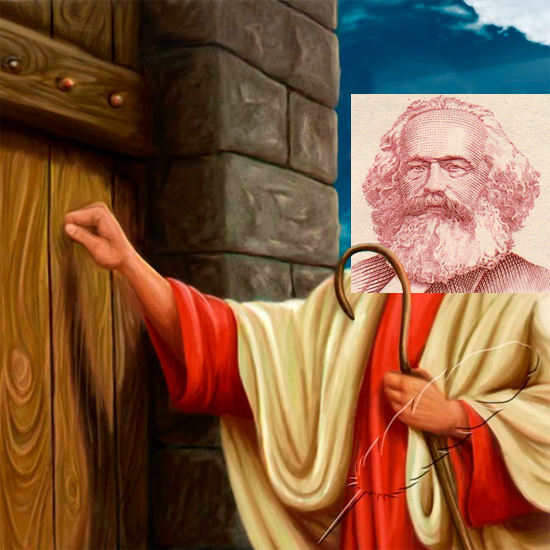Amurrica is the land of opportunity, we say. And we measure the realization of that opportunity in cash. We have developed a prosperity-gospel patriotism that sanctifies wealth, amassed by whatever means, and that impels the accusation that if you have not succeeded in Amurrica, it’s only because you haven’t tried hard enough.
Freedom, we insist, axiomatically, means that a person who fails must not have wanted to succeed very much. Gumption, grit, and olde-fashioned exertion will lead, we believe, inevitably, inescapably, to a three-bedroom house in the ‘burbs.
This is the land of opportunity, we say to failures. You must have chosen not to grab opportunity.
Craig Martin has argued that “free agency” is capitalism’s theodicy. Back in the day, people wondered why bad things happen in a system created and governed by an all-good god. Theodicy, or, rather, theodicies, had to emerge in Christianity—theological and philosophical notions that acknowledge the fact of badness but keep god good. Martin points out that when bad things happen in capitalism, its devotees rush to free agency as the concept that will keep capitalism good.
People are free to choose things, says one religious defense of god. When bad things happen, it’s because someone has chosen badness. People are free to choose things, says one patriotic defense of capitalism. When poverty happens, it’s because someone has chosen badly.
But if you believe that Amurrica’s sanctimonious devotion to free-market capitalism means that those on the outside of economic comfort and security have chosen to bury themselves, or, at least, have not chosen to unbury themselves, you should listen to the last half of This American Life, episode #253 (“The Middle of Nowhere”).
Here, you will find the first-hand account of one Julie Snyder, who found herself listening to ten months of on-hold muzak. A long-distance phone company (you remember those…) grossly overcharges her, and no number of phone calls, no amount of pleading, no intensity of wailing can make the charges go away. Over and over again—over the course of months—each of the next people Snyder calls tells her he/she will take care of the problem, and over and over again Snyder discovers not only that no one has taken care of the problem, but that the system retains no record of having given her such assurance.
No explanation could convince the collection agency sent to dynamite her credit, for no fault of her own, that the company had made a mistake. It was only the threat of exposure on a nationally-syndicated radio show that sends out one of the most popular podcasts in the universe that finally undid what had been done.
Try to think past Ms. Snyder herself and the relatively trivial matter of a phone bill for a moment to consider what Snyder’s situation suggests about the Amurrica that we would make great again.
The gospel of Amurrican agency would say that Ms. Snyder ought to have been more proactive. Amurrican ideology would assert that Ms. Snyder was free to choose her situation in life. The Great Amurrican Capitalist Theodicy would insist that Ms. Snyder brought her misery on herself and it was only her incompetence that prevented her from escaping it.
Those of us who enjoy significant comfort and privilege in the Land of the Free can speak glibly of freedom as something of which all can avail themselves, and when we do, we conclude explicitly or implicitly that the less privileged have created their circumstances by choosing this thing or that thing. Free-Market Capitalism demands this doctrine to sustain our faith in it.
But we cannot ignore the possibility that the political economy that shapes Amurrican life, these days, limits greatly the choices that a lot of people can make. Not at all negligible numbers of Amurricans are on hold, like Snyder, waylaid by an economic machine they did not make. The machine creates a problem, out of the blue, to which it presents itself as the only solution. And then the machine appears to offer a choice, but only one: wait or hang up.
And time passes. And the disaster which the system itself creates does not resolve. And the next phone call only reveals that no one in the system has given any attention to the disaster that it has, itself, made and thrust on its victim.
We have a religious discourse in this country that wants to conflate moral agency with economic agency in order to paint Amurrican capitalism as eminently good, if not divinely ordained. But the exclusionary and oppressive system that is rabid free-marketry defies the most basic tenets of Christianity.
Besides all the Jesus-talk of neighbors and eyes of camels and dogs licking Lazarus’s sores, consider St. Paul—perhaps the first “Christian”—trying to explain what being part of a divine community means:
If the foot shall say, Because I am not the hand, I am not of the body; is it therefore not of the body? … And the eye cannot say unto the hand, I have no need of thee: nor again the head to the feet, I have no need of you. (I Cor 12:15, 21)
The political premise that, in a free land, one gets what one chooses, that poverty is the consequence of poor choosing, and that prosperity is deserved and owes nothing to anyone is in open conflict with the Jesus-Paul assertion that a divine community does not regard any of its parts as extraneous, but sees the community as a body, a whole body, in which every part has claim by virtue of its plain existence on the corporate wealth.
Nay, much more those members of the body, which seem to be more feeble, are necessary… And whether one member suffer, all the members suffer with it… (1 Cor. 12:22)
On purely economic grounds, we must give up the notion that capitalist Amurrica is a Christian nation. The ongoing efforts of some to make Amurrica great again, to separate the suffering of many from the comfort of a few, to systematize the exclusion of those parts of which the few have no need, to place on interminable hold the pleas of those whose disasters the few have themselves created, are fundamentally not-Jesus-y.
In this land of choice, Christians have at least one to make: Christian or Amurrican. Because Jesus was right: one cannot be both.
———-
- Image adapted from https://commons.wikimedia.org/wiki/File:Jesus-bate-a-porta-02.jpg and https://commons.wikimedia.org/wiki/Karl_Marx












